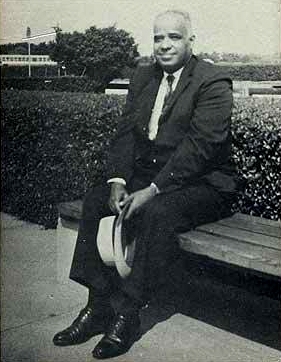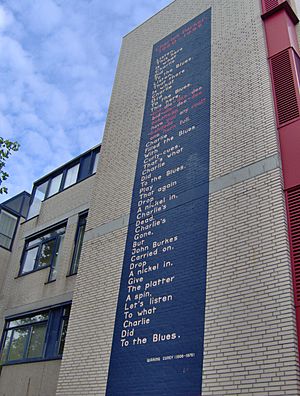Waring Cuney facts for kids
Quick facts for kids
William Waring Cuney
|
|
|---|---|
 |
|
| Born | William Waring Cuney May 6, 1906 Washington, D.C., US |
| Died | June 30, 1976 (aged 70) New York City, US |
| Occupation | Poet |
| Years active | 1927–1962 |
William Waring Cuney (born May 6, 1906 – died June 30, 1976) was an American poet. He was an important part of the Harlem Renaissance, a time when Black artists, writers, and musicians created amazing works. Cuney is most famous for his poem "No Images." This poem has been shared in many collections of poetry.
Contents
William Waring Cuney's Life Story
William Waring Cuney was born on May 6, 1906, in Washington, D.C.. He was one of two twins. His father, Norris Wright Cuney II, worked for the government. His mother, Madge Louise Baker, was a teacher in D.C. public schools.
Cuney went to public schools in D.C. and graduated from Armstrong High School. He then studied at Howard University for a while. Later, he earned his college degree from Lincoln University in Pennsylvania. He also studied music at the New England Conservatory of Music in Boston. He even studied at a music school in Rome, Italy.
His Famous Poem: "No Images"
In 1926, while Cuney was still a student, his poem "No Images" won first prize. This was in a contest held by Opportunity magazine. The poem talks about how a Black woman might feel about beauty standards. These standards often came from European ideas.
"No Images" has been included in many poetry books. It is seen as a classic poem from the New Negro Movement. This movement was a time of great artistic and cultural growth for African Americans.
Friends and Music
At Lincoln University, Cuney was a friend and classmate of the famous poet Langston Hughes. Many years later, they worked together. They co-edited a book of poems called Lincoln University Poets: Centennial Anthology, 1854–1954.
Cuney trained to be a singer, just like his brother who was a pianist. But he decided his singing voice was not good enough for a professional career. Even so, his love for music strongly influenced his writing. His poems often have a strong rhythm. Many are written like ballads or sound like blues songs.
His poems often describe everyday African Americans living in cities. Some of his poems have even been turned into songs. Famous musicians like Josh White, Al Haig, and Nina Simone have recorded them. Cuney's poems appeared in magazines like The Crisis and Black World. They were also in poetry collections put together by other well-known poets.
Later Life and Works
By the 1950s, many people in the United States had forgotten about Cuney's work. However, his poems were translated into German and Dutch. This made him popular in Europe. He published only two books of poetry during his lifetime. The first was Puzzles, a special edition released in the Netherlands in 1960. The second was Storefront Church, published in London in 1973. William Waring Cuney passed away in New York City on June 30, 1976.
See also
 | Ernest Everett Just |
 | Mary Jackson |
 | Emmett Chappelle |
 | Marie Maynard Daly |


